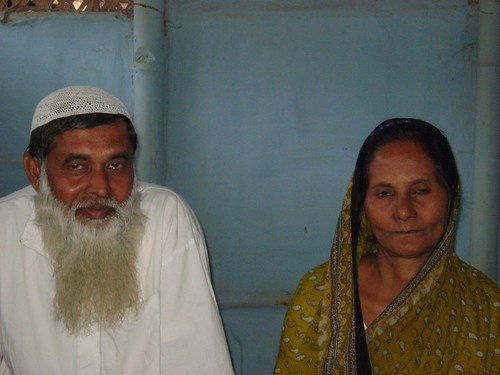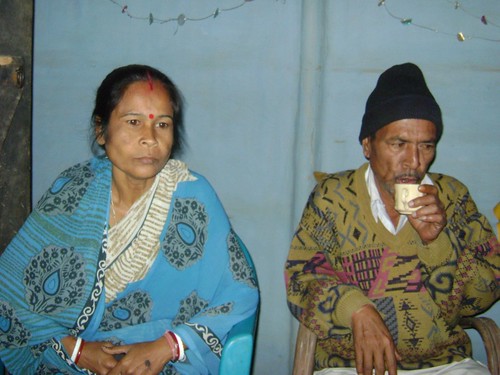By Anjuman Ara Begum, TwoCircles.net,
Guwahati: Anath Bandhu Biswas, son of Late Kishori Mohan Biswas and a resident of village Borpayek II, Nellie, Assam, served the Home Ministry as CRPF jawan from 1975 to 1997. He took voluntary retirement to be with his family. ‘I was a government employee but now a Doubtful voter [or D-voter] since 1996. I am originally from Tripura. In 1983, during the Nellie massacre, I was posted here in Nellie. I liked the place and got married here and started living here. I have cast vote before 1996. I have one son and one daughter and they are not D-voters,’ says 52-year-old Anath Biswas. His wife, Arati Biswas is also a D-voter. She said: ‘My father Narayan Mondol was a carpenter. I was born and brought up here and I don’t know why I am a D-voter’.
Many D-Voters or doubtful voters informed that in Assam, the voter list enumerated D-Voters in 1996. D-voters are those people whose citizenship is not confirmed or they are suspected as illegal migrants and hence ‘doubtful’.

Sirajuddin Ahmed and his wife Razia Begum
Rastam Ali of Borpayek II village, Nellie, Assam, is 45 years old now and a small trader by profession. His father Kalam Shah Ahmed was a cultivator and an inhabitant of the same village. Rastam’s grandfather was Hindu by religion who later converted to Islam. Rastam has four brothers and all are married. Rastam was a voter before 1996 and exercised his voting rights twice. In 1996, Rastam became D-voter. Rastam said, ‘My grandfather Moina Shiekh, whose Hindu name was Moina, was a famous Hindu priest before converting to Islam. We lived here since time immemorial. But today my citizenship is ‘doubtful’. All my brothers, family members are regular voters, but I am listed as ‘doubtful voter’. I didn’t complain anywhere. Whom to complain? No hearing took place before declaring me as D-voter. Many people are D-voters today’, lamented Rastam.
Sirajuddin Ahmed and his wife Razia Begum are both D-voters and shared a unique story. They belong to the same village of Borpayek II, Nellie, Assam. Sirajuddin is the son of late Hasmat Ali who lived in the same village and was a village leader. “My father was the government appointed Gaon Burah (village headman) during the British period. He was a much respected person. Today my younger brother Anzak Ali is the village headman. But I am ‘doubtful’ and a D-voter. I heard that we have to appear before tribunal but I won’t attend. To save my self-respect, I won’t go. I am citizen by birth. Why shall I go and proof that? It is humiliating. Citizens are treated as denizens in the name of D-voter’.
For Razia Begum, too, the story is same. ‘My father Hazi Sabdar Munshi of Kamrup, the then Nagaon district, was an employee of the British government. He worked in the Nagaon Judge court as a Juri member. He is the one who was responsible for settlement of this area. Today I am a D-voter since 1996. Before 1996, I cast vote many times. My brothers, sisters and my children are not D-voters but I am’.
Shambhi Mollik, son of Late Kalidas Mollik, 55 years of age belonging to the Nellie village is a carpenter by profession. He became D-voter in 1996. Though he was not so lucky to remove the doubtful status of his voting rights, his family member Kalpana Mollik was the lucky one to get back her status as a legal voter. Kalpana was a D-voter since 1996 but in 2008, she could correct her status and it cost her about four thousand rupees. ‘I wanted to contest Panchayat election and it was necessary for me to remove my name from the list of the D-Voters but it cost me money’.

Anath Bandhu Biswas and his wife Arati Biswas
Subodh Debnath of the Nellie too lost his voting rights as he became a D-voter in 1996. ‘I am 45 years old and I am a trader of biscuits by profession. I voted many times but now I am a D-voter. Three members of my family are D-voters – I, my wife Nelam Debnath and my brother Bijoy Debnath.
Similar stories are shared by Kamala Badya and Gauri Rani Das, two females of Nellie village. Kamala is 40 years of age and cast vote about five times before being ‘identified ‘as a D-voter. Gauri Rani Das who showed her school certificates and was born and brought up in the same village is now a D-Voter.
D-voter families informed that mostly Bengali speaking Hindus, Muslims and some Nepalis are listed as D-voters. One D-voter found the whole issues of D-voters so hilarious that he commented, ‘government is losing our precious votes by putting our names in the list of D-voters. We are losing nothing’.

